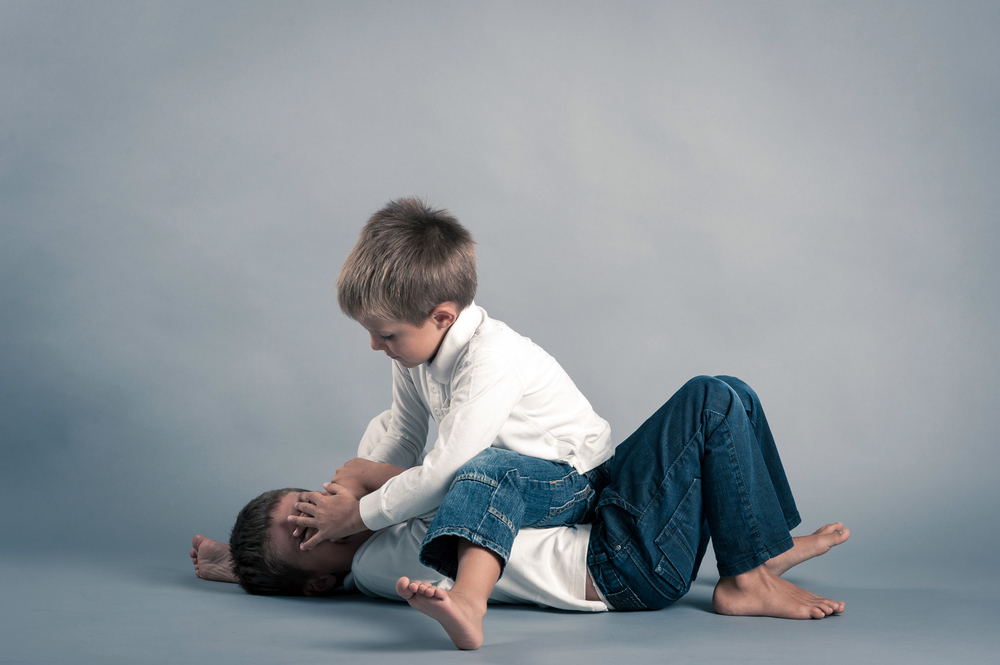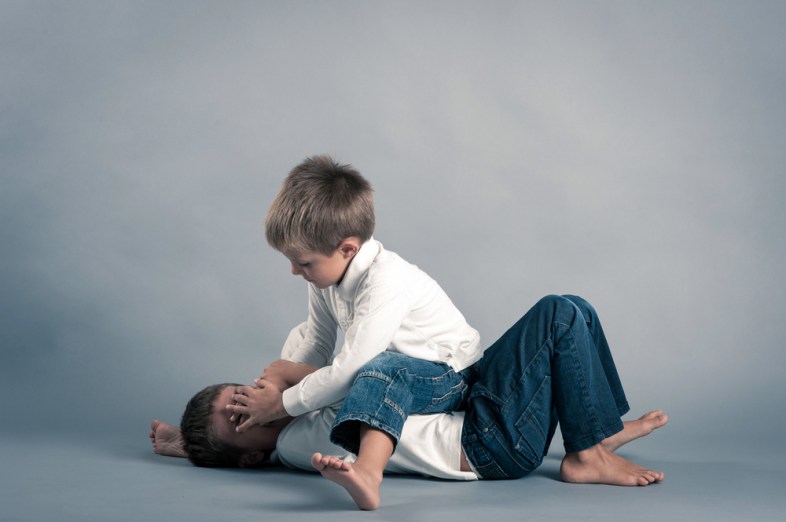
When Your Kids Hit Each Other, Don’t Consider It As ‘Normal’ Behavior. Instead, Never Tolerate It.
So, where do we draw the line between normal sibling rivalry and abusive relationships between siblings?

Did you see the recent tragic news story about a girl who shot her brother after repeatedly enduring abuse from him? Now one child is dead and the girl, her sister and both parents are facing charges. As horrible and extreme as this one story may seem, I don’t find it that surprising considering the nonchalant attitude our country has about siblings hitting, bullying, and otherwise fighting with each other. The comments you usually hear on the subject are:
- “All kids fight; it’s just normal sibling rivalry.”
- “I don’t care if they beat the crap out of each other, as long as they don’t do it in front of me.”
- “What’s the big deal? My brother and I fought all the time and I turned out alright.”
So, where do we draw the line between normal sibling rivalry and abusive relationships between siblings?
But bluntly: ANYTIME siblings are verbally cruel or abusive, sexually inappropriate, or physically violent toward one another, it is time for a parent to step in and end that behavior immediately. These are forms of sibling abuse, not “rivalry”. Letting your children slug it out is not teaching them to get along; it’s teaching them to use violence against loved ones to get what they want.
Younger children often idolize older siblings and look up to them as role models and caregivers. When those siblings abuse in any way, the devastation hits younger children hard, and they lose a sense of safety and well-being in their own homes.
This should never be tolerated by parents, and it is absolutely a form of neglect and abuse.
When children don’t feel safe in their own home, they lose their sense of worth; not just due to the abuse, but from the lack of protection from their own parents. This, of course, leads to them feeling unsafe or uncontent in other relationships (and in the world at large).
When people you love abuse you, it is easy to then expect this behavior in other so-called “loving” relationships. Research tells us that sibling abuse is psychologically and physically devastating for all involved. The abuser gains a sense of power and control from perpetuating the abuse, while the abused child’s sense of self fractures from feeling helpless and unworthy of protection.
How can parents prevent sibling abuse? Here are three ways:
1. Don’t hit or berate your children.
It may seem obvious, but don’t hit your kids—EVER, for any reason. Don’t verbally berate, humiliate or demean them. When you behave this way, it is likely that your children will model that same behavior. Also, it’s abuse! And since children can’t do the same to you, they will find a weaker victim (at school or at home) to push around in order to regain some sense of power again. As parents, we must model (and expect) kind and compassionate treatment toward every member of our family and exhibit a zero-violence policy about cruelty or violence.
Question: Is it ever okay to randomly punch, shame, or harass people at work? No! So why would you allow such behavior in your own home? If you don’t like being hit, why allow this to happen to your children? Do you like being teased and humiliated? I’m guessing not, so don’t allow your children to do that to each other. Home should always be a safe place, not a place full of emotional and physical landmines.
2. Prevent the behavior as early as possible.
Step in immediately when you see one of your children treating another poorly. Even your very young children. Give swift (non-violent) consequences firmly, every time you see your children hit or pick on one another. When you hear your children speaking cruelly to each other, step in calmly, but with complete authority that you won’t tolerate this behavior. Help your children understand that their behavior harms their siblings in ways they can never undo.
Empathy is not necessarily innate; therefore, family members must teach it.
3. Seek out professional help.
If you realize there are sibling abuse issues in your home, or you struggle managing it, get help immediately. Find a parenting coach or therapist for yourself, and a therapist for each of your children. If money is an issue, look for Health And Human Services programs in your area. Almost every community offers sliding scale fees to help families.
Figure out when and why the abuse is occurring. If it is happening when your children are home alone, you may need to consider sending them to a responsible friend’s home when you aren’t there, or have someone trusted come in to monitor them. This often helps curtail the behavior.
Sibling rivalry in the form of friendly competition and clever button-pushing is both normal and expected. So is siblings feeling frustrated with one another. But anything beyond that is dangerous to the emotional and physical well-being of all family members. Do not allow any form of sibling abuse to occur in your home, ever. Protect your children at all costs; that is the minimum responsibility of all parents. If you aren’t able to do so, get help immediately. Your children are depending on you. ![]()












